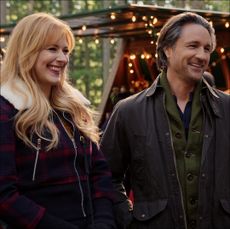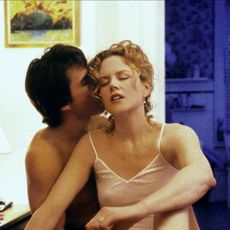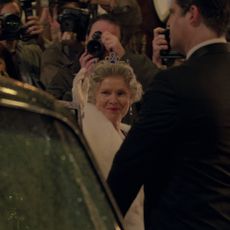
Twenty years ago in May, Pamela Smart's husband, Gregg, was murdered — by Pamela's high school lover. The ensuing media frenzy was the O.J. Simpson case of its day, with the story ultimately inspiring the Nicole Kidman movie To Die For. Pamela, then a 21-year-old media coordinator at her teenage boyfriend's school in New Hampshire, was sentenced to life without parole for conspiring to kill her husband. Since then, she has been serving out her sentence at the Bedford Hills Correctional Facility for Women in Westchester County, New York — even though she maintains her innocence in the murder.
When a friend of Pamela's named Larry Maas read a book I'd written about love and crime, he asked if I would like to meet her. I said absolutely. Here's what she had to say.
Q: How do you cope, psychologically, with a life sentence?
A: This has been a truly horrible ordeal for me. I do my best to survive and be strong, but it is not easy. A lot of the time, I wish I were dead, but I'm too much of a coward to try to kill myself. Plus, I couldn't do that to my mother. She already has enough heartache in her life from this whole thing. Also, I always wanted a daughter, and it makes me so sad that I'll never have one. For a while, I used to think that I might get out of prison someday, and I kind of took it a year at a time, thinking, OK, when is this joke going to end? But now I'm resigned to the possibility and probability that I'm going to be here for a very long time — maybe even till I die. It's so hard to think about that, and it's important not to give up all hope. I try to live one day at a time and make the most out of what I have by being the best person I can be, having close friends, and helping as many people as I can — I mean other inmates. The real purpose in my life comes from helping other people. I love my job teaching and tutoring other women. I do that every day, and I have helped other inmates get their GEDS and learn to read. That's what keeps me sane.
Q: What degrees have you earned while in prison?
A: I've gotten two master's degrees since I've been here: one in English literature and one in criminal justice. I'm also partway through a third master's in clinical pastoral education, but the minister who was helping me at the prison left, so that's on hold. I wanted that degree so I could counsel other inmates. I am a kind of spiritual aide, and I counsel and befriend anyone who needs it. I try to give hope to the hopeless.
Q: You've alleged that a guard sexually assaulted you in 2003, and you got sent to solitary confinement.
Stay In The Know
Marie Claire email subscribers get intel on fashion and beauty trends, hot-off-the-press celebrity news, and more. Sign up here.
A: I was raped by a guard. He came back later with a camera, demanding to take naked pictures of me for insurance that I wouldn't tell anyone about the rape. I refused to strip naked, but I was so scared that I reluctantly agreed to let him take pictures of me in lingerie. The pictures came out in the Enquirer, and the prison made up a crazy story that I had smuggled in the camera and taken pictures of myself to sell to the tabloids.
Q: What was solitary confinement like?
A: A nightmare. I was locked in a windowless room 23 hours a day. I was only allowed to go into "the birdcage," a little fenced-in courtyard, for one hour a day. I was in there for 72 days in all, and I lost 16 pounds. I could only take three five-minute showers a week. I had no idea what time it was — that was the worst part — and an hour felt like a week.
Q: What happened to your attacker?
A: The guard was transferred to another prison. He didn't lose his job.
Q: Describe your current cell...
A: There are 60 women on my unit. We all have our own room — a 13 x 7 cement cell. I painted my room blue, and I have a little rectangular barred window that looks onto the courtyard. There is barely enough room to turn around in my cell, with the bed, dresser, toilet, sink, and all my belongings. Imagine having all of your worldly possessions — clothes, food, books — in one tiny room. I have accumulated so much stuff over the 20 years. It's really horrible because the guards are constantly doing searches of our rooms, and depending on how mean and vindictive they're feeling on any given day, they throw my stuff all over my cell, so I have to sort through it, fold all the clothes, and clean up constantly. And it's so noisy. There's always some type of jailhouse drama going on — people arguing, acting obnoxious. It's gotten a lot worse over the past year or so because the prisoner population has become younger, with drug- and gang-related crimes. That's why, even though we are allowed to go outside into the courtyard or the gym in the evening after dinner, I choose to stay on the unit...to avoid the tension and tempers.
Q: How's the food?
A: The prison food is disgusting and so is the cafeteria, so I cook all my own food on the unit and eat on the unit. There's a five-burner stove, and I keep my food in my room in coolers. There are ice machines on the unit to keep the food fresh, but sometimes the guards lock the ice machines just to be assholes. I buy food from the commissary. We're allowed to go to commissary once every two weeks.
Q: You recently lost an appeal to sue the prison for a beating you received from fellow inmates in 1996...
A: In 1996, two girls beat the shit out of me for no reason. They broke my eye socket and nose; I had to have a metal plate put in my face. They had five years added to their sentences, but the state said it wasn't the prison's fault.
Q: I know you don't watch much TV or read the papers and that you get most of your information about the outside world from your mother and others, but have you been following the case of Amanda Knox, the American college girl in Italy who was just sentenced to 25 years in jail?
A: I heard of her, but I'm not really interested in current events. I mean, what's the point; I'll never be out there, so it really has nothing to do with me. I guess I'd tell her to take it one day at a time and not to lose hope.
Q: Is there any way to ever enjoy yourself and forget about your situation?
A: I feel really good and practically block out my entire situation when I am playing softball or dancing. I am kind of a champion softball player — we play all spring and summer. When I'm on the softball field, I am in a zone where I block everything else out. I also run a type of spiritual dance therapy group — the praise dancers — and we rehearse in the evenings and perform in church too. I absolutely love doing this. Last weekend we had a special workshop for World AIDS Day, and Maria Davis, an AIDS advocate, spoke. Then she turned on the new Whitney Houston song, "I Didn't Know My Own Strength," and pulled me up to dance. I felt inspiration coursing through my body.
-
 Celebrate Earth Month With Our Feel-Good Fashion Report
Celebrate Earth Month With Our Feel-Good Fashion ReportYour guide to being more sustainable in 2024.
By Anneliese Henderson Published
-
 Anne Hathaway Details the "Gross" Audition Request She Once Endured
Anne Hathaway Details the "Gross" Audition Request She Once Endured"Now we know better."
By Meghan De Maria Published
-
 The Emotional Ending of 'Baby Reindeer,' Explained
The Emotional Ending of 'Baby Reindeer,' ExplainedNetflix's latest miniseries from Richard Gadd is based on the true story of the comedian and his stalker.
By Quinci LeGardye Published
-
 The Best Bollywood Movies of 2023 (So Far)
The Best Bollywood Movies of 2023 (So Far)Including one that just might fill the Riverdale-shaped hole in your heart.
By Andrea Park Published
-
 ‘Bachelor in Paradise’ 2023: Everything We Know
‘Bachelor in Paradise’ 2023: Everything We KnowCue up Mike Reno and Ann Wilson’s “Almost Paradise."
By Andrea Park Last updated
-
 Who Is Gerry Turner, the ‘Golden Bachelor’?
Who Is Gerry Turner, the ‘Golden Bachelor’?The Indiana native is the first senior citizen to join Bachelor Nation.
By Andrea Park Last updated
-
 ‘Virgin River’ Season 6: Everything We Know
‘Virgin River’ Season 6: Everything We KnowHere's everything we know on the upcoming episodes.
By Andrea Park Last updated
-
 The 60 Best Musical Movies of All Time
The 60 Best Musical Movies of All TimeAll the dance numbers! All the show tunes!
By Amanda Mitchell Last updated
-
 'Ginny & Georgia' Season 2: Everything We Know
'Ginny & Georgia' Season 2: Everything We KnowNetflix owes us answers after that ending.
By Zoe Guy Last updated
-
 35 Nude Movies With Porn-Level Nudity
35 Nude Movies With Porn-Level NudityLots of steamy nudity ahead.
By Kayleigh Roberts Last updated
-
 The Cast of 'The Crown' Season 5: Your Guide
The Cast of 'The Crown' Season 5: Your GuideThe Mountbatten-Windsors have been recast—again.
By Andrea Park Published